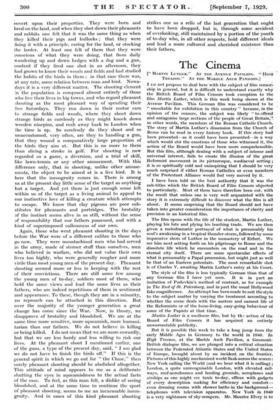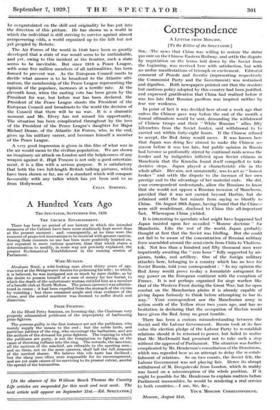The Cinema
[" MARTIN LUTHER." AT THE AVENUE PAVILION. "111G* TREASON." AT THE MARBLE ARCH PAVILION.)
I no not propose to deal here with the subject of film censor- ship in general, but it is difficult to understand exactly why the British Board of Film Censors took exception to the film Martin Luther, which is this week being shown at the Avenue Pavilion. This German film was considered to be " unsuitable for exhibition in this country " because, in the opinion, of the censors, the subject was likely " to offend and antagonise large sections of the people of Great Britain,". in other words, the members of the Roman Catholic Church. The story of Martin Luther's dissension from the Church of Rome can be read in every history book. If this story had been presented—as it could have been presented—in a way which would stir the emotions of those who witnessed it, the action of the Board would have been more comprehensible. But this film, although dealing with a subject of intense and universal interest, fails to create the illusion of the great Reformist movement in its picturesque, mediaeval setting ; it is so spiritually cold and uninspiring that I should be very much surprised if either Roman Catholics or even members of the Protestant Alliance would feel very moved by it.
I have been told on the best authority that it was the sub-titles which the British Board of Film Censors objected to particularly. Most of them have therefore been cut, with the result that unless one is very well acquainted with the story it is extremely difficult to discover what the film is all about. It seems surprising that the Board should not have taken into greater consideration the importance of clarity and precision in an historical film.
The film opens with the life of the student, Martin Luther, playing his lute and plying his teaching trade. We are then given a melodramatic portrayal of what is presumably his soul's awakening in a tropical thunder-storm, followed by some impressive shots of Luther in the monastery of Erfurt. We see him next setting forth onhis pilgrimage to Rome and the dissolute life which he encounters on the road and in the eternal city itself. There are some spectacular effects of what is presumably a Papal procession, but might just as well be that of an Eastern potentate. The most remarkable shot is of Charles V. awaiting Martin Luther's entry at his Court.
The style of the film is less typically German than that of any German film I have yet seen. It is in cart an imitation of Pudovkin's method of contrast, as for examjile in The End of St. Petersburg, and in part the usual Hollywood fake magnificence. An attempt has been made to suit the style to the subject matter by varying the treatment according to whether the scene deals with the austere and earnest life of the Reformists or of the loose-living, easy-going behaviour of some of the Papists at that time.
Martin Luther is a mediocre film, but by the action of the Board of Film Censors it has acquired an entirely unwarrantable publicity.
But it is possible this week to take a long jump from the early Middle Ages in Germany to the world in 1940. Iii High Treason, at the Marble Arch Pavilion, a Gaumozit- British dialogue film, we are plunged into a critical situation between the Federated Atlantic States and the United Stat,es of Europe, . brought about by an, incident, on the frontier. Pictures of this highly mechanized world flash across the screen : New York calling the World (and we hear what it is calling) ; London, a quite unrecognisable London, with elevated rail- ways, roof-aerodromes and landing grounds, aeroplanes and airships as one might see taxis to-day, offices with gadgets of every description making for efficiency and comfort— even dressing rooms, with shower baths in the background— telephones with television apparatus. New York in 1940 is a very nightmare of sky-scrapers. Mr. Maurice Elvey is to
be congratulated on the skill and originality he has put into the direction of this picture. He has shown us a world in which the individual is still striving to survive against almost Overpowering _odds, a world organized up to the hilt but not yet peopled by Robots.
The Air Forces of the world in 1940 have been so greatly developed that a state of war would seem to be unthinkable, and yet, owing to this incident at the frontier, such a state seems to be inevitable. But since 1918 a Peace League, with some five million members of all nationalities, has been formed to prevent war. As the European Council meets to decide what answer is to be broadcast to the Atlantic ulti- matum, the membership of the Peace League representing the opinion of the populace, increases at a terrific rate. At the eleventh hour, when the casting vote has been given by the President for war, but before war has been declared, the President of the Peace League shoots the President of the European Council and broadcasts to the world the decision of the Council that there will be no war. It is a dramatic moment and Mr. Elvey has not missed his opportunity. The situation has been complicated throughout by the love of the President of the Peace League's daughter for Major Michael Deane, of the Atlantic Air Forces, who, in the end, gives up his military career, and becomes himself a member of the Peace League.
A very good impression is given in this film of what war in the air would mean to the civilian population. We are shown an imaginary air attack on London and the helplessness of any weapon against it. High Treason is not only a good entertain- ment, it is a film with a serious purpose. It is satisfactory that both the two full-length British talking pictures, which have been shown so far, are of a standard which will compare favourably with any talkie which has yet been sent to us

































 Previous page
Previous page